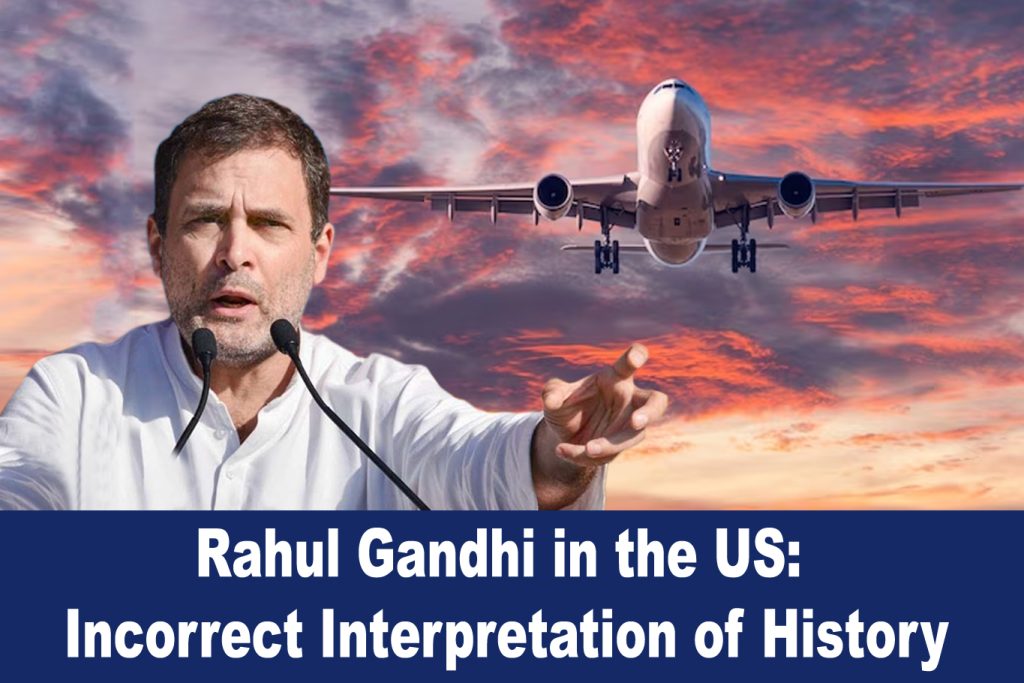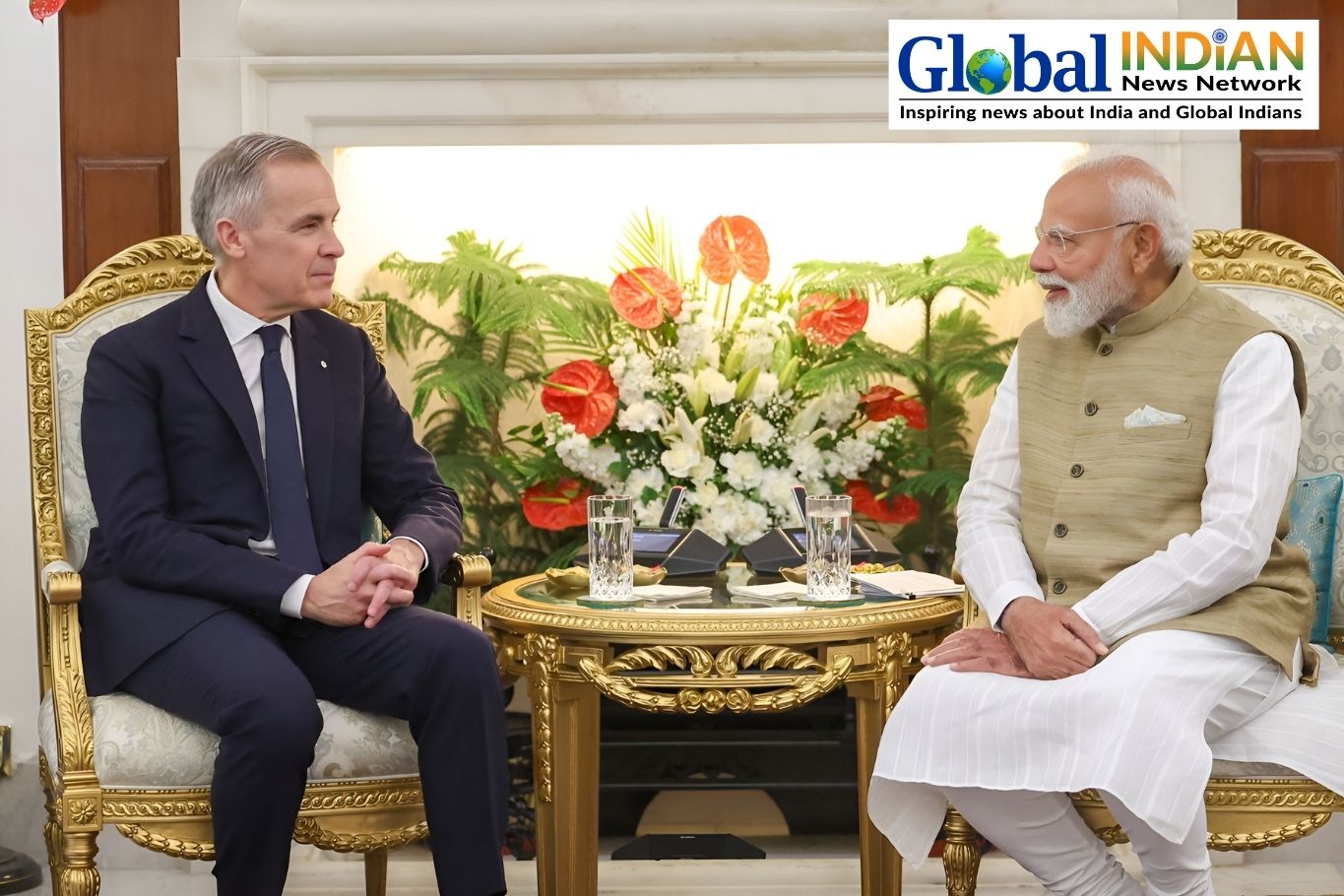 Rahul Gandhi recently embarked on a 10-day tour of three cities in the United States. During his visit to New York, the final leg of his tour, he delivered a speech to the Indian diaspora that included several peculiar statements. Continuing a pattern seen in his overseas visits, Gandhi criticized India and its government, while also making factually inaccurate claims about the country’s history, democracy, and leaders.
Rahul Gandhi recently embarked on a 10-day tour of three cities in the United States. During his visit to New York, the final leg of his tour, he delivered a speech to the Indian diaspora that included several peculiar statements. Continuing a pattern seen in his overseas visits, Gandhi criticized India and its government, while also making factually inaccurate claims about the country’s history, democracy, and leaders.
In his speech, Gandhi began by asserting that the Congress party upholds the principles of Mahatma Gandhi, whereas the RSS and BJP (used as a general reference to Hindus who do not support the Congress party) align themselves with the ideals of Nathuram Godse, the man responsible for Mahatma Gandhi’s assassination.
According to Gandhi, India is engaged in an ideological battle between Mahatma Gandhi (represented by the Congress party) and Nathuram Godse (symbolizing the thoughts and ideology of the BJP and RSS).
Gandhi further stated that the Congress party cherishes the same principles and ideology as the “Father of the Nation,” Mahatma Gandhi. He emphasized, “Our ideology follows that of Mahatma Gandhi, an NRI (non-resident Indian) who was a kind and humble man, dedicated to non-violence and a lifelong pursuit of truth. However, the ideology followed by the BJP and RSS is that of Nathuram Godse, a violent and resentful individual who couldn’t confront the realities of his own life.”
Referring to Mahatma Gandhi as an NRI, Gandhi claimed, “The reason Godse shot Gandhi was his inability to face his own life, leading him to vent his anger on someone else. He chose to direct his anger towards the man who epitomized the essence of India. Gandhi was progressive, modern, and open-minded, while Godse only dwelled on the past and never contemplated the future. He was filled with anger and hatred, and he was driven by fear. Essentially, he was a coward who couldn’t handle his own life. On the contrary, Gandhi ji confronted the mightiest power on the planet, a superpower, with humility. All of you are following in the footsteps of Gandhi ji, Nehru, Ambedkar, and Sardar Patel.”
Gandhi concluded this outburst by uttering the phrase “Jai Bhim.”
Dr. BR Ambedkar’s Views on MK Gandhi
It is interesting to note that Rahul Gandhi’s statements reflect a lack of understanding and honesty about history. Although Rahul Gandhi concludes with ‘Jai Bhim,’ he conveniently ignores BR Ambedkar’s own criticism of MK Gandhi. In one of his essays, Ambedkar wrote, “Treachery and deceit are the weapons of the weak. Gandhi has always used these weapons.” He further added, “He approached the Muslims and promised to support their 14 demands if they, in turn, opposed the demands put forth by the representatives of the Depressed Classes. Even a scoundrel would not have done this. This is just one example of Gandhi’s treachery.”
In the same essay, Dr. Ambedkar expressed his distress over Hindu-Muslim hostility, which he attributed to the deceitful actions of Gandhi. He stated, “This deeply pained me. There is an old saying that fits the situation (Bagal mein chhurri Munh mein Ram): ‘God’s name on the lips and a dagger under the armpit.’ If such a person can be called a Mahatma, then by all means call Gandhi a Mahatma.”
Ambedkar also remarked, “The politics of Savarkar and Tilak was based on honesty and truth. It was not hollow and noisy. However, Gandhi’s politics is hollow and noisy. It represents the most dishonest politics in the history of Indian polity. Gandhi was responsible for removing morality from politics and introducing commercialism into Indian politics. Politics has been stripped of its virtue.”
Interestingly, while the Congress party and Rahul Gandhi have consistently criticized Veer Savarkar, it is worth noting that Ambedkar himself praised Savarkar’s politics as honest and truthful, comparing him to Tilak, a prominent Congress leader and former head of the party before it was taken over by MK Gandhi and Jawaharlal Nehru.
Unfortunately for Rahul Gandhi, history is often more nuanced than what can be encapsulated in political speeches by the uninformed. While it is undeniable that individuals like MK Gandhi played a role in India’s independence, reducing it to a simplistic ideological battle between Gandhi and Godse overlooks the complexity of history that leaders should focus on to avoid repeating mistakes in future generations.
The Views of Nathuram Godse on MK Gandhi and Their Alignment with BR Ambedkar’s Perspective
A comprehensive analysis of BR Ambedkar’s true sentiments towards MK Gandhi would reveal that he believed Gandhi not only contributed to the persecution of Hindus but also forever doomed India by appeasing the Muslim community, who were committing severe atrocities against Hindus at the time. It is possible to delve into the subject extensively, highlighting how Ambedkar’s views on Hindu-Muslim unity, the plight of Hindus, and the role of MK Gandhi in that plight align more closely with Nathuram Godse than with the supposed ideals of MK Gandhi. It is important to clarify, however, that endorsing Godse’s actions and the assassination of MK Gandhi is unthinkable and unacceptable. Nevertheless, the claim that Godse killed Gandhi due to his inability to confront his own life is rhetorical and a distorted interpretation of history.
In his courtroom speech following the assassination of Gandhi, Nathuram Godse extensively discussed his motivations. He criticized Gandhi’s fanaticism regarding non-violence and accused him of contributing to the genocide of Hindus, among other grievances. In paragraph 56 of Godse’s speech, he states, “(…) To imagine that the bulk of mankind is or can ever become capable of scrupulous adherence to these lofty principles in its normal life from day to day is a mere dream.” He further asserts, “I could never conceive that armed resistance against an aggressor is unjust. I consider it a religious and moral duty to resist and, if possible, overpower such an enemy through the use of force.”
In essence, Godse believed that MK Gandhi’s advocacy of non-violence was a facade that ultimately led Hindus to their destruction at the hands of Muslims. He accused Gandhi of standing idly by as Hindus were massacred, urging them to sacrifice themselves for the sake of unity. According to Godse, India was a distressed and blood-soaked land due to the decisions made by Gandhi. In the present day, it may be difficult to comprehend the magnitude of the violent turmoil that led Godse to assassinate Gandhi. It is crucial to emphasize that no rational individual would endorse political assassination. However, an objective analysis of Godse’s critique of Gandhi and BR Ambedkar’s critique reveals more areas of agreement than disagreement.
Nevertheless, it is important to recognize that Godse’s actions have forever cast a shadow over Hindus. The bullet-ridden body of Gandhi has been used to demonize anyone who discusses Hindu rights, and even an honest evaluation of Gandhi’s legacy has become taboo due to discussions about Godse and the assassination. Godse’s actions have hindered the opportunity for a fair examination of history. However, for Rahul Gandhi to praise BR Ambedkar while condemning the “ideology” of Godse is a reductionist view of history that serves only political agendas.
If Rahul Gandhi intends to turn elections into a battle of ideologies by referencing Godse and Gandhi, he might as well acknowledge that within that limited spectrum, the battle is between the perspectives of BR Ambedkar and Gandhi. However, such a stance may not align with his “Jai Bhim” politics. Additionally, while Rahul Gandhi claimed that Godse only dwelled on the past, the reality is that Godse assassinated Gandhi due to the present plight of Hindus—a concern shared by BR Ambedkar’s criticism of Gandhi.
What India truly needs is an honest assessment of historical mistakes, including those made by Gandhi and Godse, to prevent their repetition, which could lead to the genocide of Hindus and the partition of India. Rahul Gandhi’s rhetoric impedes these efforts significantly and should be recognized as a subversion of India, its history, and its future interests.










